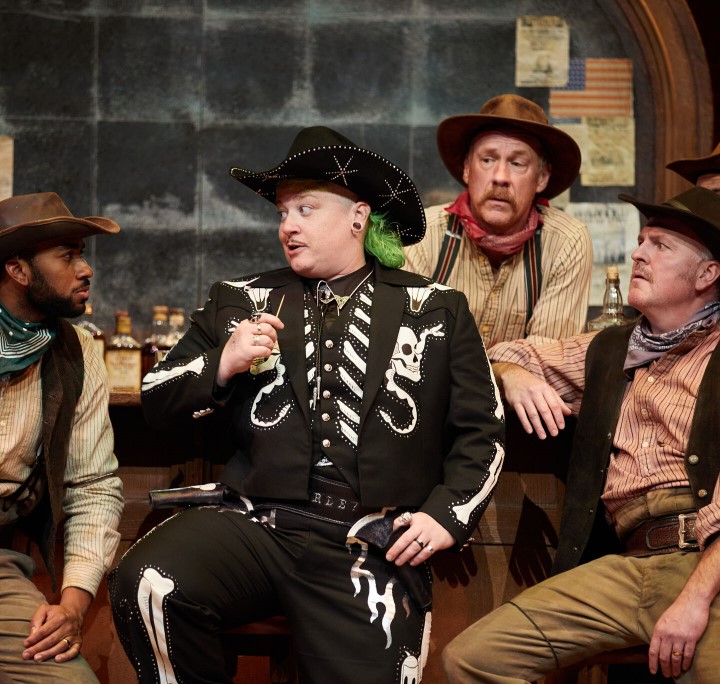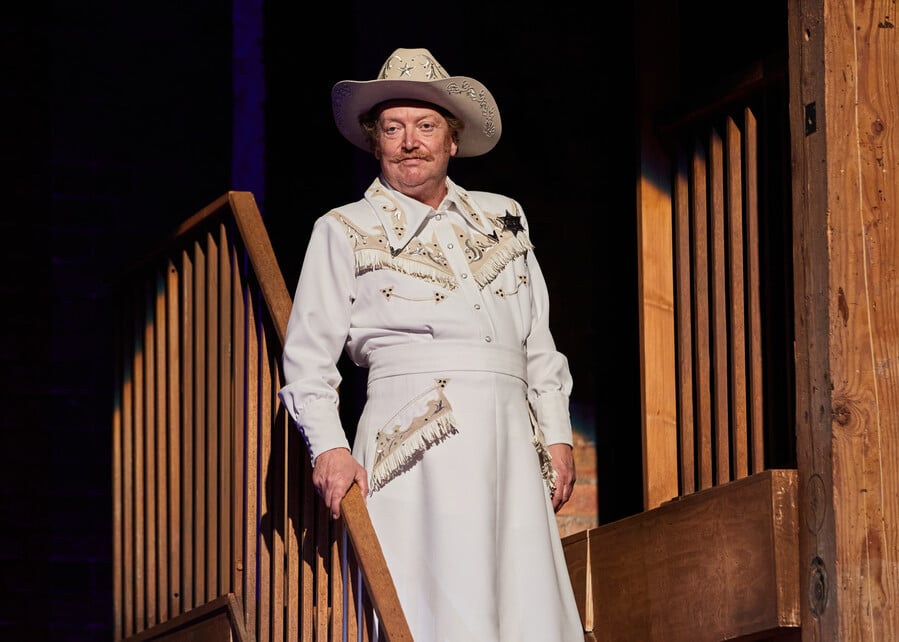The Meh, The Bad and the Transmisogynistic
They're doing sexology down at the saloon!
Heeey I was so deeply inspired by the feelings I had about Cowbois that you’re getting a newsletter! But first, some art that I liked!
JOY RIDE [2023] - Love to see that regardless of the diaspora we are all cringe! But aside from that it’s a fun time, and Stephanie Hsu continues to be 100% that bitch.
CHUNGKING EXPRESS [1994] - I’ve watched this before but god there’s something special about watching a Wong Kar Wai film in a comfy cinema with a screen that’s just a little too small for its audience capacity. Excited to watch more in this Prince Charles WKW season!
THE BITTER TEARS OF PETRA VON KANT [1972] - The OUTFITS, the WIGS, the MOODINESS, just real powerful stuff all around.
X

With an initial run in Stratford-upon-Avon and now at the Royal Court Theatre, the RSC production of Cowbois tells the story of a small Wild West frontier town where all the men have disappeared for months and a stray outlaw Jack Cannon (Vinnie Heaven) wanders in and changes everyone’s perspective on life. The show is written and co-directed by Charlie Josephine, best known for the infamous I, Joan at the Globe.
A Fistful of Pronouns
Act one of the play has two near parallel scenes, where Jack Cannon’s sliver tongue convinces members of the town to explore their gender beyond what has been previously allowed. Jack helps wean the Sheriff of the town (Paul Hunter) off alcohol in a healthy way and encourages them to try on a skirt. Then he helps Lou (Lee Braithwaite) figure out his posture and find the confidence to exist as himself. However, there is a crucial difference in results.
From the moment Lou enters dressed as himself he is referred to with they/them pronouns and then later as a man. However, when the Sherriff enters they talk not about newfound transness, but about feeling liberated and sexy as a man in a dress (something which got laughs in the Royal Court). The idea that the Sheriff still identifies as a man is reiterated throughout the rest of the show.

There are indeed cis men who enjoy wearing dresses (or other feminine items of clothing), for fun, fashion, sexual pleasure, or a plethora of other reasons. It is also true that there are transfemme/otherwise genderqueer people who sometimes use he/him pronouns or identify with manhood in some capacity. However, I don’t buy that this show, which operates in broad strokes, unsubtle moments where character voice is replaced by Charlie Josephine’s own political cries and transhistorical identifiers, suddenly discovers subtlety exclusively for transfemme gender. So I think it’s important to take the play at its word that the Sherriff is being written as a cis queer man and think about what that means for the queer imagination being employed here.
This is a show that can stretch to ambiguous trans magic allowing a trans man to become the biological father of a cis woman’s baby (an inspired choice with mixed execution), but refuses to use that same imagination to allow the existence of transfemininity on the frontier - even when there are historical examples of trans women in the Wild West.
While the Sheriff is never allowed to be a trans woman she sure does suffer like one. This is the character that faces the most on-stage humiliation. In one scene the Sherriff is forced at gunpoint to break sobriety repeatedly (which a friend helpfully pointed out is straight out of Sarah Kane’s Cleansed) - and that’s very dramatically effective. However, less effective is the constant broad and often flat comedy about him being a useless drunk (often only held up by Hunter’s skilled physical and tonal comedic work).
This humiliation all comes to a head at the opening of the second act when there is an extended sequence of homophobic and transmisogynistic jokes towards the Sherriff that eventually results in an attempted sexual assault of the Sheriff (not in the content warnings) which nearly made me and my friends walk out. I think frankly it is fucking weird to refuse to have any embodied transfemme character but also insist on pulling from the violent experiences of trans women to demonstrate how shitty these cis men are - especially when most of these men are later redeemed in throwaway moments.
Again, given that this is explicitly a cis character, it’s interesting how the tropes are still followed and The Sheriff’s ending is that they die to save Jack and it falls flat - part of it is dodgy direction but there’s also just a broader issue of who/what is put in focus. All of this tells me exactly whose joy is prioritised, which crimes can be forgiven, whose dramatic resolution matters. The result is that this is a character written not for trans people, and certainly not for transfemmes, but for people who like drag queens and panto dames but don’t like trans women.
The dearth of imagination also goes broader, with the result of the play mirroring Renaissance comedy in that everyone is married off in heterosexual pairings. Having the men doing the marrying being trans still doesn’t fully change that - especially when they’re both marrying cis women. The occasional lesbian sexual tension within the text and certainly within the performances remains unexplored.
I am deeply uninterested in a trans joy which exists entirely around the primacy of sex. Where imagination, freedom and embodiment only extend to people who the doctor decided were female based on their genitalia. Yet Charlie Josephine’s text, and the work of some of his contemporaries who haven’t quite reached his level, seem so dull and narrow in their view of what it means to make theatre and performance work that does gender transgression.
Lonely Are The Black
The vision of the cowboy in popular culture is one of a mythical apex of white masculinity, a strong bulwark against the dangers (read: Indigenous people) of the so-called wilderness. This is especially true by the time these images are brought over to the UK and also eroticised modern queer contexts.
What's missed by many queer adaptations of the cowboy is that the image being evoked is inherently one of white supremacy. In many ways, the frontier queerness at play with cowboys runs parallel to the many stories of queer colonial officers being able to explore themselves because they’re so far from home, yet at the same time still being agents of imperialism. And to (re?)claim the gender/racial diversity and complication of real-life cowboys requires you to face that head-on, but in art like Cowbois we sidestep the core issue.
Similarly to Hamilton, race exists when it's useful for a zinger that feels more about dunking on strawman racists than engaging with white supremacy as structure had on, but never at any other time. Except of course it always does, so the show ends up producing several loaded images on stage: a Black child and a Black woman both being there to conveniently offer wisdom to people who need it; a Black man initially being the most vocally transphobic and performing the attempted sexual assault referenced above; trans men in the show being people but their relationship with gender and race never being engaged with. As an aside, I think it’s silly how this follows a trend of theatre I’ve seen recently having a Black actress who was clearly a superior singer of a fairly talented bunch be sidelined due to the role she’s in.
What's equally important is also what's off stage which is Indigenous people. Occasionally they're mentioned in a zinger, or in a weirdly inserted anti-immigrant monologue to prove the racism of these cis men (I think it is very telling that in the text racism starts and ends with cis men - with everyone else being accepting). I think perhaps the worst example of the weird references to Indigenous people was when they're uncritically and exotically evoked (specifically with tribe names but only the ones London punters world recognise), to talk about gender being expansive without ever bringing that expansive existence on stage. Indigenous queer people have also often talked about how their frameworks are very different to Western gender - so to try and invoke those norms to "fix" the West's constrictive gender moulds is reductive and fetishistic.
I think it's interesting to have and make art about cultural fantasies with complex moral weight attached to them. But there's an approach to race in both the text and the production itself that swings back and forth between hollow self-importance and complete carelessness. I simply don’t think we get to have a trans joy that ignores or actively facilitates racial domination.
I want trans theatre which feels thought through. Where we can have the moments of joy that work in this show, but in pieces of art that feel complete. Where radicalism isn’t just an affect but a practice, with politics and craft that feels specific and actualised not just pot shots at easy strawmen. Where work engages with the broader community - not just the ones who feel comfortable at the Women and Non-BinaryTM networking event.
Add a comment: